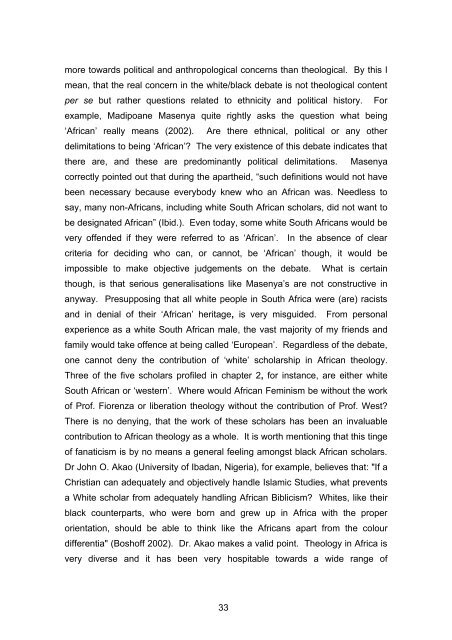African Hermeneutics: The Current State - Theology In Africa
African Hermeneutics: The Current State - Theology In Africa
African Hermeneutics: The Current State - Theology In Africa
You also want an ePaper? Increase the reach of your titles
YUMPU automatically turns print PDFs into web optimized ePapers that Google loves.
more towards political and anthropological concerns than theological. By this I<br />
mean, that the real concern in the white/black debate is not theological content<br />
per se but rather questions related to ethnicity and political history. For<br />
example, Madipoane Masenya quite rightly asks the question what being<br />
‘<strong><strong>Africa</strong>n</strong>’ really means (2002). Are there ethnical, political or any other<br />
delimitations to being ‘<strong><strong>Africa</strong>n</strong>’? <strong>The</strong> very existence of this debate indicates that<br />
there are, and these are predominantly political delimitations. Masenya<br />
correctly pointed out that during the apartheid, “such definitions would not have<br />
been necessary because everybody knew who an <strong><strong>Africa</strong>n</strong> was. Needless to<br />
say, many non-<strong><strong>Africa</strong>n</strong>s, including white South <strong><strong>Africa</strong>n</strong> scholars, did not want to<br />
be designated <strong><strong>Africa</strong>n</strong>” (Ibid.). Even today, some white South <strong><strong>Africa</strong>n</strong>s would be<br />
very offended if they were referred to as ‘<strong><strong>Africa</strong>n</strong>’. <strong>In</strong> the absence of clear<br />
criteria for deciding who can, or cannot, be ‘<strong><strong>Africa</strong>n</strong>’ though, it would be<br />
impossible to make objective judgements on the debate. What is certain<br />
though, is that serious generalisations like Masenya’s are not constructive in<br />
anyway. Presupposing that all white people in South <strong>Africa</strong> were (are) racists<br />
and in denial of their ‘<strong><strong>Africa</strong>n</strong>’ heritage, is very misguided. From personal<br />
experience as a white South <strong><strong>Africa</strong>n</strong> male, the vast majority of my friends and<br />
family would take offence at being called ‘European’. Regardless of the debate,<br />
one cannot deny the contribution of ‘white’ scholarship in <strong><strong>Africa</strong>n</strong> theology.<br />
Three of the five scholars profiled in chapter 2, for instance, are either white<br />
South <strong><strong>Africa</strong>n</strong> or ‘western’. Where would <strong><strong>Africa</strong>n</strong> Feminism be without the work<br />
of Prof. Fiorenza or liberation theology without the contribution of Prof. West?<br />
<strong>The</strong>re is no denying, that the work of these scholars has been an invaluable<br />
contribution to <strong><strong>Africa</strong>n</strong> theology as a whole. It is worth mentioning that this tinge<br />
of fanaticism is by no means a general feeling amongst black <strong><strong>Africa</strong>n</strong> scholars.<br />
Dr John O. Akao (University of Ibadan, Nigeria), for example, believes that: "If a<br />
Christian can adequately and objectively handle Islamic Studies, what prevents<br />
a White scholar from adequately handling <strong><strong>Africa</strong>n</strong> Biblicism? Whites, like their<br />
black counterparts, who were born and grew up in <strong>Africa</strong> with the proper<br />
orientation, should be able to think like the <strong><strong>Africa</strong>n</strong>s apart from the colour<br />
differentia" (Boshoff 2002). Dr. Akao makes a valid point. <strong>The</strong>ology in <strong>Africa</strong> is<br />
very diverse and it has been very hospitable towards a wide range of<br />
33


